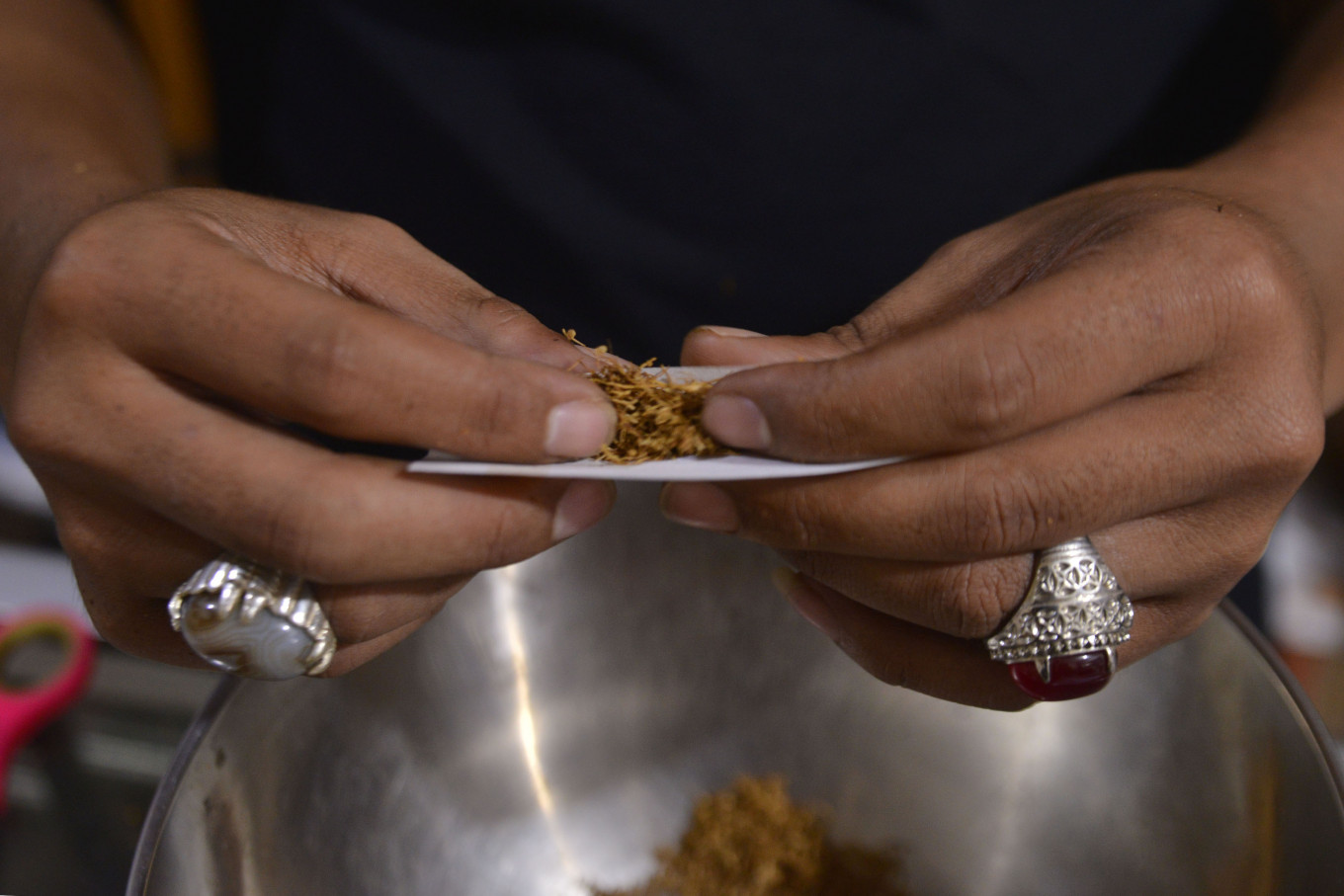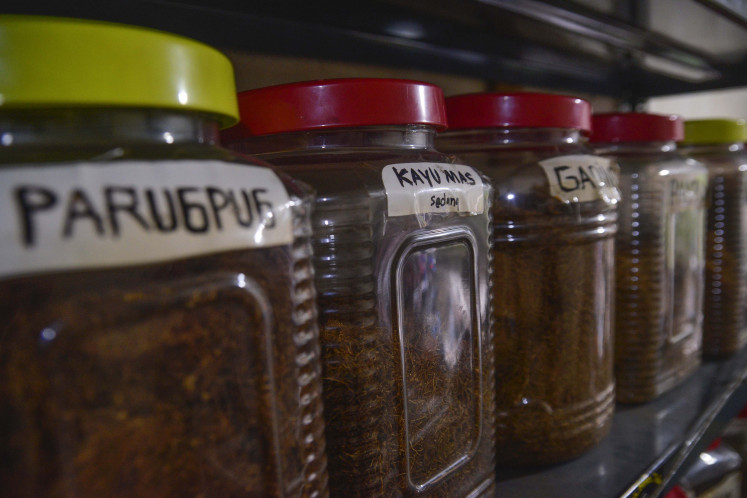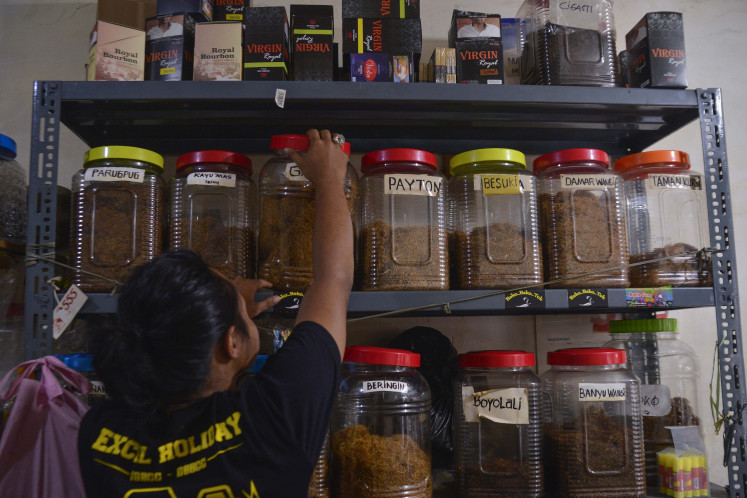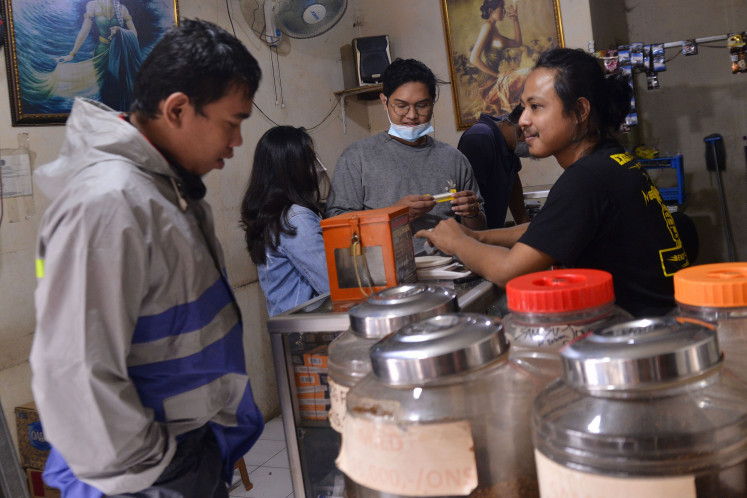Paying the price of tobacco: Indonesian smokers continue their habit with 'tingwe'
The pandemic has turned many avid smokers to a cheaper alternative called tingwe.
Change Size

Last year, like it was for many others, was a time of financial struggle for Dwi Herlambang.
In June, the journalist was laid off from his job. The 24-year-old was lucky enough to be hired by another company within a few months but with a salary significantly lower than the last one. He had committed to renovating his house prior to the pandemic, and that meant even more bills to pay.
He had to think of every single expense, including one of his basic needs besides food: cigarettes.
Dwi had learned that the government would increase the cigarette excise tax in 2021 by an average of 12.5 percent in order to boost its tobacco excise tax revenue to Rp 173.78 trillion (US$12.15 billion). And he had known it could raise the price of his favorite mild cigarettes.
Despite facing financial issues, Dwi was unable to give up the habit he had begun when he was still in junior high school.
“Smoking cigarettes has become my lifestyle,” he told The Jakarta Post.
Dwi said he needed to smoke, especially when he had to finish long-form stories.
“I can’t write if I don’t smoke. It’s like I’m stuck.”
But Dwi ran into a solution during a casual meeting with friends this January. They introduced Dwi to tingwe, short for linting dewe (Javanese for self-rolling). Next, he was introduced to a small tobacco kiosk in Depok, West Java.

Dwi followed a friend's advice to buy mixed-formula tobacco: Darmawangi and Mole tobacco from West Java and Kemloko tobacco harvested at the foot of Mount Sumbing in Temanggung, Central Java.
For three days, Dwi had a sore throat and he had to adapt to rolling his own tobacco. But he huffed and puffed his way through the challenge.
"If I had quit [tingwe], I would not have been able to stop smoking industrial-made cigarettes," Dwi said.
Same old health risks
Though its advocates may wax poetic about tingwe, its benefits remain debatable health-wise. It has shown to present the same risk of illnesses as regular cigarettes, including increasing the risks of cancer, tuberculosis and Alzheimer’s.
For the local smokers interviewed, this seems to matter little, as they see tingwe’s primary benefit as being an economical alternative to branded cigarettes.
Dow said he had saved a good amount of money since he stopped consuming industrial cigarettes. Now he spends around Rp 120,000 per month; far less than the Rp 600,000 he used to shell out for his packs of milds.
Another unintended benefit, Dwi said, was that he used to smoke 16 cigarettes a day but had reduced that number to 10 because of the effort it took to roll up a tingwe.
Antismoking advocates such as the Australian website quit.org.au notes that health-wise, the idea of “smoking less” is an illusion, as roll-your-own cigarette smokers tend to take deeper and longer drags.
Sandi Pulungan, or Solin, a 29-year-old activist from an environmental NGO, also prefers tingwe for economic reasons. He began to use self-rolling tobacco at the end of 2019, though he was first introduced to it by his friends in 2017.
He is now a kasturi (high-nicotine tobacco with a sweet scent from Lombok, West Nusa Tenggara) lover.
Like many Indonesians, Solin has been smoking since his high school days, finishing a pack of cigarettes in two to three days — even two packs a day if he was hanging out with his friends.

He could spend Rp 1 million a month on cigarettes, plus his favorite snacks as a companion.
He now spends about Rp 200,000 for a kilogram of kasturi, which lasts him three months. He averages a whopping 30 to 50 rolls daily.
Now, he can only enjoy tingwe cigarettes and said that branded ones made him feel queasy.
Growing market
Businesses have noticed the growing popularity of tingwe.
Yudi Hermawan, the owner of Tingwe 73, a tobacco kiosk in West Jakarta, sells a notable amount of tingwe along with regular brands. Since the pandemic, the 46-year-old has gained a 30 percent increase in sales of tingwe cigarettes. Though he does not know whether these new buyers were previously non-smokers or branded-cigarette smokers, he said that the trend had become so apparent that a number of new tingwe-focused kiosks had opened up nearby in the past few months.
The growth has made it possible for Yudi to open another kiosk in Serpong, Banten, with another on the way in Pamulang, also in Banten.
Alternative way to consume tobacco
Jibal Windiaz from Komunitas Kretek (Kretek Community) a tobacco-consumer advocacy community, said Indonesian tobacco consumers would not give up smoking even in dire times.
"People are being laid off from their jobs [...] but smoking remains a [basic] need," Jibal told the Post.
Brand cigarette producers may not see tingwe and other forms of alternative cigarettes as a threat yet, but some say that they should start taking notice.

"All major cigarette producers must be worried not only about tingwe, but also illegal cigarettes," said Muhaimin Moetie, the head of the Association of White Cigarette Producers.
Sellers like Yudi seem optimistic that the tingwe trend will continue to grow. He sees it becoming like regular cigarettes: Indonesia’s next basic need.
“It's like rice,” he said.









